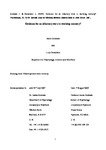Evidence for an olfactory store in working memory?
| dc.contributor.author | Andrade, J | |
| dc.contributor.author | Donaldson, L | |
| dc.date.accessioned | 2015-05-05T21:49:35Z | |
| dc.date.available | 2015-05-05T21:49:35Z | |
| dc.date.issued | 2007-01-01 | |
| dc.identifier.issn | 0033-2852 | |
| dc.identifier.issn | 1347-5916 | |
| dc.identifier.uri | http://hdl.handle.net/10026.1/3339 | |
| dc.description.abstract |
We tested the hypothesis that olfactory information can be temporarily retained in a modality-specific short-term memory system. The results of two experiments using short-term memory tasks supported this hypothesis. Experiment 1 showed an effect of concurrent odour memory on digit recall that was equivalent to the effect of concurrent visual memory and smaller than that of concurrent verbal memory. Experiment 2 showed a detrimental effect of concurrent odour memory on odour recognition, and no effect of concurrent verbal and visual memory tasks. Based on these findings, and on published evidence for rehearsal and imagery of olfactory information, we tentatively conclude that there is a subsystem in working memory dedicated to temporary maintenance of olfactory information. | |
| dc.format.extent | 76-89 | |
| dc.language | en | |
| dc.language.iso | en | |
| dc.publisher | Psychologia Society | |
| dc.subject | olfaction | |
| dc.subject | odor | |
| dc.subject | selective interference | |
| dc.subject | memory load | |
| dc.title | Evidence for an olfactory store in working memory? | |
| dc.type | journal-article | |
| dc.type | Article | |
| plymouth.author-url | https://www.webofscience.com/api/gateway?GWVersion=2&SrcApp=PARTNER_APP&SrcAuth=LinksAMR&KeyUT=WOS:000249186400002&DestLinkType=FullRecord&DestApp=ALL_WOS&UsrCustomerID=11bb513d99f797142bcfeffcc58ea008 | |
| plymouth.issue | 2 | |
| plymouth.volume | 50 | |
| plymouth.publication-status | Published | |
| plymouth.journal | Psychologia | |
| dc.identifier.doi | 10.2117/psysoc.2007.76 | |
| plymouth.organisational-group | /Plymouth | |
| plymouth.organisational-group | /Plymouth/Admin Group - REF | |
| plymouth.organisational-group | /Plymouth/Admin Group - REF/REF Admin Group - FoH | |
| plymouth.organisational-group | /Plymouth/Faculty of Health | |
| plymouth.organisational-group | /Plymouth/Faculty of Health/School of Psychology | |
| plymouth.organisational-group | /Plymouth/REF 2021 Researchers by UoA | |
| plymouth.organisational-group | /Plymouth/REF 2021 Researchers by UoA/UoA04 Psychology, Psychiatry and Neuroscience | |
| plymouth.organisational-group | /Plymouth/REF 2021 Researchers by UoA/UoA04 Psychology, Psychiatry and Neuroscience/UoA04 REF peer reviewers | |
| plymouth.organisational-group | /Plymouth/Research Groups | |
| plymouth.organisational-group | /Plymouth/Research Groups/Centre for Brain, Cognition and Behaviour (CBCB) | |
| plymouth.organisational-group | /Plymouth/Research Groups/Centre for Brain, Cognition and Behaviour (CBCB)/Cognition | |
| plymouth.organisational-group | /Plymouth/Research Groups/Institute of Health and Community | |
| plymouth.organisational-group | /Plymouth/Research Groups/Plymouth Institute of Health and Care Research (PIHR) | |
| plymouth.organisational-group | /Plymouth/Users by role | |
| plymouth.organisational-group | /Plymouth/Users by role/Academics | |
| dc.identifier.eissn | 1347-5916 | |
| dc.rights.embargoperiod | Not known | |
| rioxxterms.versionofrecord | 10.2117/psysoc.2007.76 | |
| rioxxterms.licenseref.uri | http://www.rioxx.net/licenses/all-rights-reserved | |
| rioxxterms.type | Journal Article/Review |


